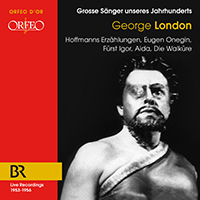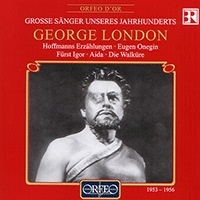Richard Kraus
The son of the Wagnerian tenor Ernst Kraus, Richard Kraus studied at the High School for Music in Berlin, and in1923 was engaged as a répétiteur at the Berlin Staatsoper, where he worked with Erich Kleiber and Leo Blech. After four years in this post, he moved through several opera houses as a conductor (Kassel, 1927–1928; Hanover, 1928–1933, Stuttgart, 1933–1937) before becoming chief conductor at Halle, where he stayed throughout World War II, from 1937 to 1944. During his time at Halle he participated in the Handel revival with a production of the opera Agrippina. Kraus also conducted Wagner’s Der fliegende Holländer at the 1942 Bayreuth Festival and a recording of this production has survived. After the war he was active at the Düsseldorf Opera before being appointed chief conductor at Cologne, in 1948. During his five years there Kraus conducted several outstanding radio recordings of operas by Richard Strauss, Wagner and others. Between 1954 and 1961 he was chief conductor of the Städtische Oper, Berlin, prior to its renaming as the Deutsche Oper in 1961, making several commercial recordings of operatic excerpts and orchestral works for German companies such as Deutsche Grammophon and Ariola- Eurodisc. He conducted the 1955 Berlin production of Busoni’s Doktor Faust, with Dietrich Fischer-Dieskau in the title role, which helped to introduce this work to the international repertoire. From 1961 he taught at the Berlin High School for Music, and between 1963 and 1969 he was chief conductor of the North West German Philharmonic Orchestra at Herford.
Kraus’s great skills as a theatrical conductor are preserved in the recording of his 1942 account of Der fliegende Holländer from the Bayreuth Festival and in the radio recordings of operas which he made during the late 1940 and early 1950s, predominantly with the West German Radio Symphony Orchestra based in Cologne. These include powerful readings of Richard Strauss’s Elektra, with Astrid Varnay in the title role; Verdi’s Macbeth, with Josef Metternich; Wagner’s Lohengrin with Peter Anders, and Parsifal with Martha Mödl as Kundry; Humperdinck’s Königskinder; and Pftizner’s Palestrina with Julius Patzak. Among Kraus’s commercial recordings, that of excerpts from Offenbach’s Les Contes d’Hoffman is not only particularly outstanding, but also quite different from most interpretations, fully realising the ambiguous character of this sinister opera. Kraus also skilfully accompanied the pianist Shura Cherkassky in a popular recording of Tchaikovsky’s Piano Concerto No. 2, and the baritone Dietrich Fischer-Dieskau in Hans Werner Henze’s Five Neapolitan Songs. He typified the best kind of German Kapellmeister, always able to breathe vivid life into the operatic repertoire, whatever the work.
© Naxos Rights International Ltd. — David Patmore (A–Z of Conductors, Naxos 8.558087–90).


















